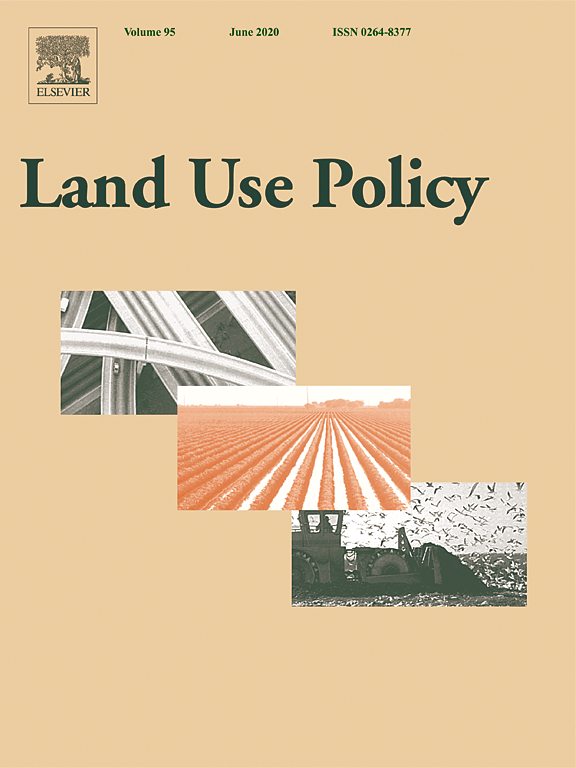Location
Land Use Policy is an international and interdisciplinary journal concerned with the social, economic, political, legal, physical and planning aspects of urban and rural land use. It provides a forum for the exchange of ideas and information from the diverse range of disciplines and interest groups which must be combined to formulate effective land use policies. The journal examines issues in geography, agriculture, forestry, irrigation, environmental conservation, housing, urban development and transport in both developed and developing countries through major refereed articles and shorter viewpoint pieces.
Land Use Policy aims to provide policy guidance to governments and planners and it is also a valuable teaching resource.
ISSN: 0264-8377
Members:
Resources
Displaying 176 - 180 of 279Triangulation in participation: Dynamic approaches for science-practice interaction in land-use decision making in rural China
Land use decision making requires knowledge integration from a wide range of stakeholders across science and practice. Many participatory methods and instruments aiming at such science-practice interaction have been developed during the last decades. However, there are methodological challenges, and little evidence neither about the methodological applicability and practicability under diverse socio-political conditions nor about their dynamics. The objective of this paper is to offer some insights on the design and implementation of reasonable science-practice interaction.
Adaptive biodiversity management of semi-natural hay meadows: The case of West-Norway
Worldwide semi-natural habitats of high biological value are in decline. Consequently, numerous Agri-Environment Schemes (AESs) intended to halt biodiversity loss within these habitats have been implemented. One approach has been the application of “adaptive management”, where scientific knowledge is applied alongside the traditional ecological knowledge (TEK) of stakeholders in order to establish an integrated approach that is adjusted as outcomes are assessed. In this paper we examine the effectiveness of the adaptive management approach of Norway’s Action Plan for Hay Meadows (APHM).
Land ownership and technology adoption revisited: Improved maize varieties in Ethiopia
The lack of land ownership can discourage agricultural technology adoption, yet there is scarce evidence of the impact of land rental contracts on the adoption of improved crop varieties in developing countries. The current study investigates such impact using a nationally representative survey of Ethiopian maize farmers. In contrast to many previous studies, we show in a simple model that cash-renters are as likely to adopt improved maize varieties as owner-operators, while sharecroppers are more likely to adopt given that such varieties are profitable.
Urban expansion dynamics and modes in metropolitan Guangzhou, China
Urbanization changes urban landscapes and results in ecological and environmental problems. To solve these problems, it is essential to quantify the dynamics of urban expansion and better understand the modes of urban sprawl. This study evaluated urbanization in metropolitan Guangzhou, China from 1990 to 2020 and explored its modes of urban growth using Landsat Thematic Mapper images and simulated landscape maps based on the Conversion of Land Use and its Effects (CLUE) modeling framework.
Playing by the rules? Analysing incremental urban developments
Current urban developments are often considered outdated and static, and the argument follows that they should become more adaptive. In this paper, we argue that existing urban development are already adaptive and incremental. Given this flexibility in urban development, understanding changes in the so-called ‘rules of the game’ which structure and change collective action, is increasingly relevant. Gaining such insights advances the ability of planners to deal with perceived spatial problems. The aim of this paper is twofold.



